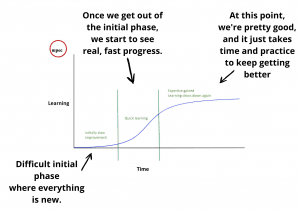A lot of our online followers, as well as clients who come to us looking for help, tell us the same thing over and over again. “My English is NOT improving“. They are unhappy, frustrated and even angry at all of the time, energy and money invested in learning English without perceiving real results.
Why does this happen? Well, I’m going to tell you here, but you can also find the answer in the video below, at the end of this post.
To understand why this happens, we must first understand more about learning English. Learning English, or another language in general, is similar to going to the gym or preparing to run a marathon. It’s a long process. Let’s take the idea of running a marathon, or trying to bench press 150kgs. Both of these are goals or objectives that many people work towards every day. If you want to lift 150kgs, you have to start with something much, much lighter, train three or four times a week, gradually increasing the weight as you progress.
The same can be said of a marathon. In order to be able to run 42km (26 miles) you have to start training months and months and months in advance with shorter distances, gradually adding kilometres as you get fitter and better.
In both cases, the people involved may have trainers whom they see once or twice a week, but they most likely work more and harder when they are not with their trainers.

Let’s imagine a person, Frank, 45 years old, wants to run a marathon next week. We could ask him the following question: “Are you fit enough to run a marathon?“
Here’s Frank’s answer: “I was part of the athletics team when I was in school. Then, 4 or 5 years ago I ran with some friends once a week for a couple of months, so hopefully I’ll be ok”. Frank’s attempt to run the marathon will be a disaster, of course. We could apply the same question and answer to someone who want’s to take part in a weight-lifting competition.
Apply all of this to English, now. If you have to use English for one reason or another, but you haven’t been using it regularly, you will probably find yourself in the same position as Frank trying to run the marathon. He may finish the marathon, but it will take a long, long time and it will be very painful and stressful both physically, mentally and emotionally.
Clearly, we need to prepare. If you think you have prepared, just ask yourself some quick questions now: When was the last time I trained? What did I do? How frequently am I training? What exercises am I doing? If you find it difficult to answer these questions, then your preparation is probably not as good as it could be. If you can answer them, and you still feel ‘stuck’, don’t worry, there’s more!
Have a look at the Learning Curve:

The first phase of our learning journery is slow and confusing. It can be quite frustrating and we feel that we are making very little progress.
Once we get past that first phase, however, we start making amazing progress, we become more confident and we grow very quickly.
In the last phase, where we have become good enough to do what we need to do, the growth slows quite dramatically. It’s also important to point out that it’s much more difficult to demonstrate growth at this stage because improvements are made in areas that are difficult to measure – vocabulary, speaking skills, listening skills and confidence in using the language studied.
So, it may well be that you have moved into the last phase where it is significantly harder to identify improvements. Think about the marathon runner who achieves the desired distance for the first time during his or her training. Do you think they stop at that point saying “OK, I did it! Now, I can run the marathon!” I am quite certain they don’t. They most likely try to repeat the same achievement a number of occasions trying to reduce the amount of time it takes them to do it.
We should be doing the same thing in English. And for this reason, we would like to invite you to take the mpec challenge: read one page a day and do 10 minutes of active listening a day.
A Page A Day: Choose a book you really want to read, or a book you have already read and love and start reading one page a day. Don’t stop to check every word; only stop to check words if you don’t understand what’s going one. After a very short time you will see that you are reading much more quickly than at the start, and, amazingly, you have started to understand new words without ever having looked them up in a dictionary.
10 Minutes A Day: The first and most important thing to understand here is that your goal is To Listen, not To Understand! I know, it might seem strange, but it isn’t. If you never hear English spoken, how can you get better at understanding conversation? You have to get exposure to hearing English first, then comprehension will follow. You probably already know enough vocabulary to understand a lot of what is on TV these days, but your ears are probably not trained well enough in recognising the sounds. So, bring your ears to the listening gym. You can put subtitles in English if you want, no problem at all. After a couple of months, you will see a difference. After 6 months, you will not believe your ears!
So, are you in?




